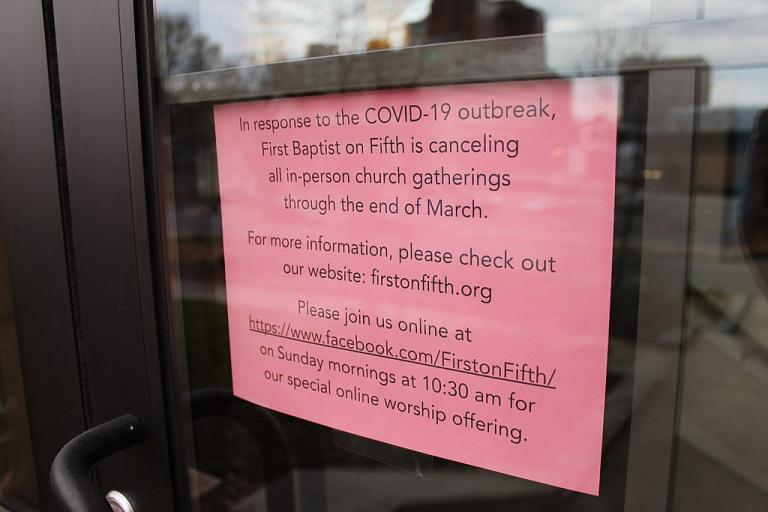Here is another problem with online worship: Instead of meeting virtually with your own congregation’s service, you can livestream celebrity church!
To help us out with Easter, CNN had a feature From the Pope to Mariah Carey, here are some options for your Easter service livestream. You could link to Joel Osteen’s service, which was featuring the pop star Mariah Carey. For Catholics, you could livestream the Pope. The Presbyterian Church (USA) was offering a 37 minute Easter service for all of their congregations to use. Or you could link to a Charlotte megachurch, with was offering six services throughout Easter day.
Once we get used to online services, will local congregations become obsolete? These star-studded attractions with high production values would have a big competitive advantage over regular churches recording their services with smart phones. Viewers from all over the world could gravitate to their favorite services, forming not just megachurches but gigachurches and terachurches, with virtual denominations and only one pastor. Could online church could do to local congregations what Amazon has done to brick and mortar retail?
Used rightly, online services can help congregations come together virtually when they can’t meet in person, joining with each other to hear God’s Word and to worship Him under the leadership of their own pastor. But there are limits to what online worship can accomplish. Christianity–with its doctrines of creation, incarnation, resurrection, sacraments, and vocation–is an embodied religion. And worship needs to be embodied too. Longtime reader and commenter on this blog Tom Hering put it very well in his comment to our Good Friday/Easter post:
The most unhappy reality of our temporary “exile” is our loss of the full sensory experience of worship. We can still experience online services through sight and hearing, but being reduced to these two senses is a great impoverishment. We don’t taste the bread and wine, or smell the wine, or touch the elements with our hands and tongues. We don’t feel the nearness of other people – something we sense with our whole body. We don’t feel the vibrations from voices and musical instruments. These losses remind us we’re physical creatures. They teach us we can only be happy as physical creatures. A non-physical Heaven populated by disembodied spirits would be no heaven at all. (Our nature as physical beings also explains the revival of ink-and-paper books, vinyl records, film photography, brick-and-mortar shopping, etc.)
Joy Pullman, the executive editor of the The Federalist and a Missouri Synod Lutheran, has pointed to another group of Christians that is denied the opportunity to worship together and to receive the Sacraments: Persecuted Christians. God’s people who are in prison or concentration camps are cut off from their churches, yet they are certainly faithful and cared for by God. In our current circumstances, we can think of them. We are not suffering as they are, but we too, in a much lesser way, are experiencing what it’s like to have the government telling us how we may or may not worship.
In another article, Pullman shows how some jurisdictions are putting more restrictions on churches than they are on secular gatherings. Where meetings of 10 people or fewer are allowed with social distancing, churches trying to set up small groups of that number to worship and receive the sacraments are being threatened with punishment. Some authorities are forbidding “drive in church,” in which worshippers stay in their cars to listen to the corporate service on the radio. The governor of Kentucky has said authorities would write down the tag numbers of cars in church parking lots on Easter morning, whereupon their owners would be thrown into a mandatory 14-day quarantine.
Pullman reports how the governor of Indiana, a Republican, is presuming, among many other things, to tell churches how they are supposed to conduct communion. Among his guidelines:
- It is preferred that no communion be distributed.
- In instances when communion is distributed, only prepackaged communion may be used and must be prepared and distributed in a manner that meets food safety standards.
He is referring to those little fast-food-style packets with a small cracker and a sip of grape juice. We Lutherans, as well as other sacramental churches, would never use those! For one of many reasons, because Christ’s institution requires actual wine. (Nor may we have bread and wine at home that the pastor consecrates online. Nor may the pastor consecrate a bunch of elements, then send them out to members at home. For why, see this.)
To be sure, we are in the middle of a pandemic. Churches ought not completely defy the civil authorities, as some are doing–this Pentecostal megachurch in hard-hit Louisiana held an Easter service for 1,000 worshippers, distributing “anointed handkerchiefs” to heal them of any diseases they might get–refusing to submit to the lawful magistrates, a violation of Romans 13, and refusing their obligations to love and serve their neighbors, a violation of Christ’s command to do so. But churches that agree to follow the social distancing requirements and other COVID-19 requirements ought not to be shut down by the state.
Some of our politicians are exercising their emergency powers with too much relish. In their apparent zeal to outdo each other in the severity of their measures to slow the epidemic, they are not letting any other considerations get in their way. Not economic needs, and certainly not civil liberties. They are running rough-shod not just over the freedom of religion but also other guarantees in the Bill of Rights. The government’s prudential measures to require social distancing and staying at home might make it impossible for a business to function, but does it really have the authority to order private businesses to shut down? Can’t there be some crafting of measures that keep civil liberties in mind?
So far, the courts are sending mixed messages. A federal judge has blocked the mayor of Louisville from banning COVID-19 emergency-compliant drive-in services, marveling at the overreach in eloquent terms:
“An American mayor criminalized the communal celebration of Easter,” U.S. District Judge Justin Walker wrote in a temporary restraining order issued Saturday. “That sentence is one that this Court never expected to see outside the pages of a dystopian novel, or perhaps the pages of The Onion. … The Mayor’s decision is stunning. And it is, ‘beyond all reason,’ unconstitutional.”
Meanwhile, the Kansas Supreme Court upheld the right of the Governor to put limitations on religious gatherings.
“But these measures are necessary!” we might be told. “Besides, they are only temporary. Even Abraham Lincoln suspended civil liberties in time of war. When we are trying to save lives, civil liberties are a luxury. You have to be alive before you can worry about freedom.”
We might wonder, though, how long is temporary? One month becomes two, and the whole timeframe is open-ended. And even when the epidemic fizzles out, what precedents will have been set? Will we have become used to the government restricting our liberties, for our own good, of course? Will we start accepting that as the price of the government taking care of us?
As for invoking “necessity” as the all-justifying reason, I can’t help but think of the line from Milton: “Necessity, the tyrant’s plea” (Paradise Lost, Book IV, ll. 393-394).
UPDATE: A California county ruled that online worship services may not include singing.
UPDATE: For more examples of ridiculous abuses of power, read this.
UPDATE: For what is happening in democracies around the world–ruling by decree, suspending civil liberties, cancelling elections, intrusive use of police, etc.–read this, originally from the Washington Post: Leaders seize new powers to fight coronavirus, fears grow for democracies.
UPDATE: The Justice Department says it will investigate cases of local governments that are unfairly targeting churches.
Photo credit: Breawycker / CC BY-SA (https://creativecommons.org/licenses/by-sa/4.0) via Wikimedia Commons












